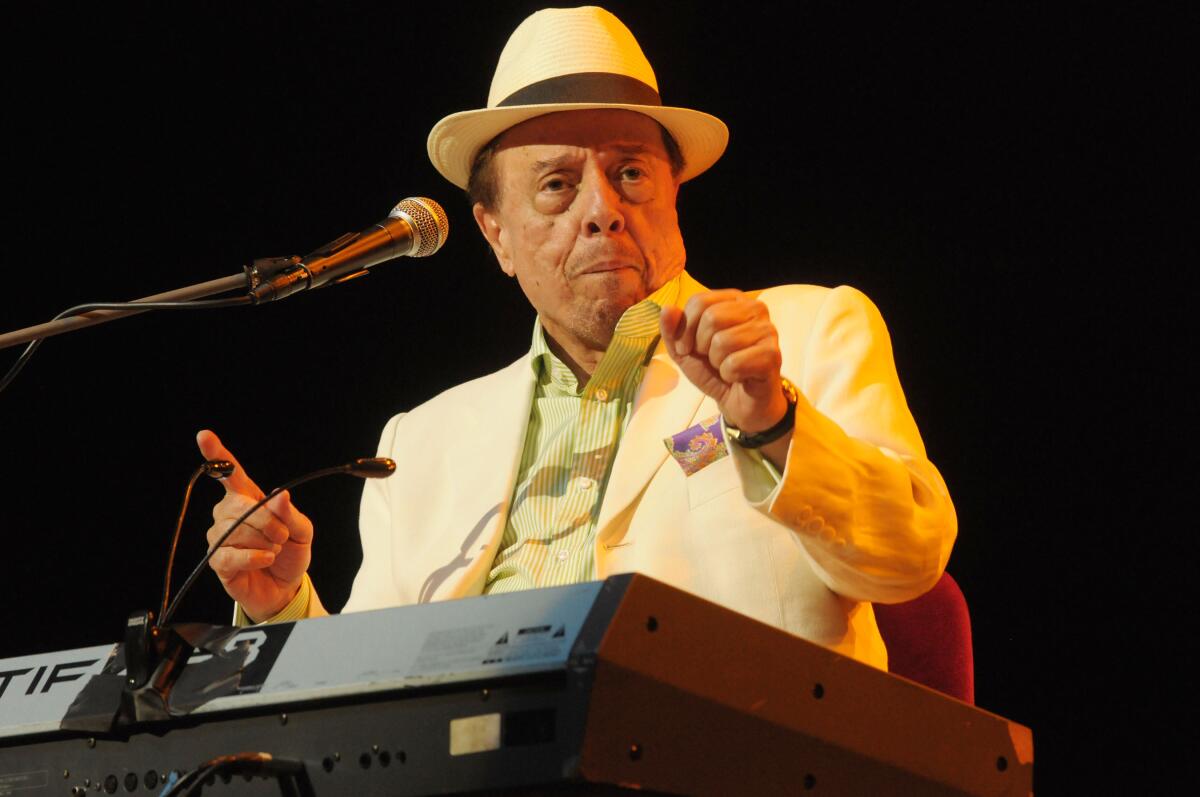Sérgio Mendes, Brazilian band leader who helped popularize bossa nova, dies at 83

- Share via
Sérgio Mendes, the Brazilian bossa nova impresario and pianist who helped popularize the genre in the ‘60s and toured with Herb Alpert and Frank Sinatra, has died.
The recording artist died “peacefully” Thursday in Los Angeles, with his wife Gracinha Leporace Mendes and their children by his side, his family confirmed in a statement shared with The Times. He was 83.
The statement did not reveal a cause of death but said the singer’s health “had been challenged by the effects of long term COVID.” Mendes “leaves us with an incredible musical legacy from more than six decades of a unique sound,” the family said.
How Brazilian musician Sergio Mendes made his mark on L.A.
Mendes found global acclaim as a solo artist, bandmember in groups like Brasil ’66 and as a collaborator across genre.
Born in 1941 in Niterói, near Rio de Janeiro, he became a popular pianist in the nightclubs on Rio’s Beco das Garrafas (Bottles Alley), a cluster of venues where artists performed the emerging genre of bossa nova while neighbors threw bottles at rowdy partygoers. Bossa nova blended Brazilian samba rhythms with American jazz. Alongside peers like composer Antônio Carlos Jobim, singer-guitarist João Gilberto, lyricist Vinícius de Moraes and guitarist Roberto Menescal, the music captured the city’s sensuous beach culture and its young and hopeful mood in the late 1950s and early ‘60s, a sound lovingly evoked in the 1959 film “Black Orpheus.”
Mendes cut his first solo album “Dance Moderno” in 1961, a collection of jazz covers by Duke Ellington and Cole Porter alongside Brazilian compositions by Jobim and Gilberto. He quickly began touring in the U.S., and performed at a legendary 1962 concert at New York’s Carnegie Hall that showcased bossa nova to novice American audiences. That show helped make the movement a sensation worldwide, and hits like Gilberto and Stan Getz’s “The Girl From Ipanema” in 1964 would soon become jazz and pop staples.
Mendes performed with jazz acts like Cannonball Adderley (on 1963’s “Cannonball’s Bossa Nova”) and flautist Herbie Mann, and signed with Atlantic under Nesuhi Ertegun, label head Ahmet Ertegun’s brother.
With 1964’s military coup in Brazil, however, the country’s future darkened. Mendes moved to L.A. that year, playing residencies at jazz clubs like Hollywood’s Shelly’s Manne-Hole.
“I immediately liked it,” Mendes told the Times in a 2021 interview. “I liked it because of the climate. It was so much less stressful than New York; it was relaxed. It had more to do with me...Things happen really spontaneously here. All of that has to do with Hollywood, with the music industry, and the wonderful place that is Los Angeles”
He cut major-label albums with his group Sergio Mendes & Brasil ‘65, though none sold especially well. At the suggestion of A&M records producer Richard Adler, and backed by the label’s Herb Alpert and Jerry Moss, Mendes brought on female vocalists to perform in English and Portuguese. This new incarnation of his band, Brasil ‘66, had a hit with “Mas Que Nada” by songwriter Jorge Ben Jor, and helped bring Brazilian music to the mainstream in the U.S. even with Portuguese lyrics. “People didn’t know what it meant, and it didn’t matter,” Mendes recalled. “It just made people feel good.” The song hit no. 47 on the Hot 100 and the album, “Herb Alpert Presents Sergio Mendes & Brasil ’66,” went platinum.
The band’s 1967 album “Look Around” set the popular formula of blending original work with bossa nova covers of English-language songs, including the Beatles’ “With a Little Help From My Friends” and “The Look of Love,” penned by Burt Bacharach and Hal David, which Mendes performed at the Oscars in 1968. After a near-total lineup change, Mendes and Brasil ‘66’s fourth LP, “Fool on the Hill,” yielded two top 10 singles with covers of Simon & Garfunkel’s “Scarborough Fair” and the Beatles’ title track (Mendes said Paul McCartney told him it was his favorite cover version).
He maintained a prolific output in the 1970s, releasing more than an album a year with new lead vocalist Gracinha Leporace, whom he would later marry, and a reconfigured band known as Brasil ’77 performing songs by Leon Russell and Stevie Wonder (whom Mendes wrote Portuguese lyrics for on “Bird of Beauty”). 1983’s self-titled album became a mid-career hit, yielding a Hot 100 No. 4 single with the Barry Mann and Cynthia Weil-penned “Never Gonna Let You Go,” and who also wrote Mendes’ 1984’s single “Olympia” for the 1984 L.A. Olympics.
In 1993, Mendes won his only Grammy with “Brasileiro,” which won for world music album, and featured the hit single “Magalenha,” written by Carlinhos Brown. After the lounge-music and neo-soul waves of the late ‘90s and early 2000s, which brought renewed interest to his Brasil ’66 catalog, Mendes teamed up with Black Eyed Peas founder will.i.am for 2006’s “Timeless,” which featured vocals from contemporary soul singers like Erykah Badu, Jill Scott, india.arie, John Legend, Stevie Wonder and Justin Timberlake.
“I like ‘disruption,’ you know?” Mendes said in an interview. “Making an album with Cannonball was, for me, a little disruption, artistically speaking. It’s the same type of experience working with Will.”
Mendes won two Latin Grammys and earned an Oscar nomination in 2012 for theme song “Real In Rio,” for the animated film “Rio,” and was the subject of a loving 2020 documentary, “Sérgio Mendes: In the Key of Joy,” where stars like Legend and Quincy Jones lauded his contributions to Latin and popular music alike. His last album, “In the Key of Joy,” was released the same year.
He last performed in November 2023 with shows in Paris, London and Barcelona. In a tribute posted online, A&M label boss and jazz giant Alpert wrote that “Sergio Mendes was my brother from another country...He was a true friend and extremely gifted musician who brought Brazilian music in all its iterations to the entire world with elegance and joy.”
Mendes is survived by Leporace, his widow, their two children Tiago Mendes and Gustavo Mendes, and his three children from his first marriage, Bernardo, Rodrigo and Isabella Mendes. “The family is processing this loss and more details regarding funeral and memorial services will be provided at a later date,” the family’s statement said.
More to Read
The biggest entertainment stories
Get our big stories about Hollywood, film, television, music, arts, culture and more right in your inbox as soon as they publish.
You may occasionally receive promotional content from the Los Angeles Times.













